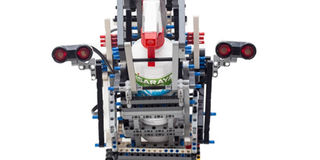Staying safe with automated dispensers

Teamwork: Pascal Agaba Ruhindayo, and Abdullah Enes Kut are some of the members of the Galaxy International School’s Robotics club. The club members came up with an automated dispenser. PHOTO | COURTESY
As the pandemic set in, many health guidelines were put in place and along the way, some individuals started making their own masks and hand sanitizers (in spray bottles) to ease the observance of standard operating procedures.
While it is true that sanitizing hands can lessen the spread of the virus, it is also true that by pumping that bottle, there is a possibility of picking up the virus (if the previous user was infected) from the pump surface.
Innovation
To kill the boredom during the long school break, the year 11 and year nine students of Galaxy International School’s Robotics club members, under the supervision of their teacher, Mikail Alici, decided to try out something that would help the community, under the supervision of their patron. They set out to make a robot that senses a hand and sanitizes it, without physical contact.
“We decided to start up on this project after communicating with our teachers because it just didn’t feel right to just sit at home and do nothing,” Abdullah Enes Kut, a Year 11 student at Galaxy International School, says.
The sensor is hinged with chains (like those on a bicycle), more of lego bricks to the bottle that carries the sanitizer. When it senses your hand, the chains rotate, pressing the neck of the bottle and the liquid is sprayed out of the nozzle to your hand. It goes back to its initial position, ready for the next pair of hands.
“You just put your hand near the sensor, which will spray the sanitiser into your hands. This will help us reduce the spread of the virus through contact,” Pascal Agaba Ruhindayo, a teammate on the project says.
The students believe that with this project, the chances of spreading Coronavirus through contact will be reduced.


